I was all set to write about coyotes and wolves for this issue when Hurricane Helene tore through our area. As I write this, my computer is being powered by a generator as we wait for the electricity to be turned back on. That will entail the power company cutting the two trees hanging in our power lines, which will only happen after the larger neighborhoods around us get their power back1.
We are certainly better off than my hometown area of Western North Carolina, where flooding has decimated practically everything. My dad in Black Mountain, just outside of Asheville, got 13 inches of rain in 48 hours. In the mountains every cove and holler and small valley has a creek running through it. Between the excessive rain and the assistance of gravity, that meant every road alongside a creek was damaged or washed away, stranding unknown numbers of people.
Currently Dad is stranded at his retirement community where water has run out and food is being rationed. He and his friends are charging their phones off a generator and sharing food from their cupboards. He just texted me, wondering if the water in the back of the toilet tank is clean enough to drink2.
Suddenly, writing about wolves or coyotes or even how animals survive a hurricane didn’t seem that important. The people of that region were all I could think about.
One of the hardest parts about this disaster was the isolated feeling that comes with lack of information. Somehow, Dad had spotty enough service that he could call to tell us he was safe. But we didn’t know how bad the flooding was or which roads were open or where people might get gas or whether residents of the area had access to water and food. As information began to trickle in, we discovered that all interstates into the Asheville area were closed due to mudslides or washouts.
We decided we had to go get Dad, so we solicited donations from family and friends to buy supplies to deliver on the way. We ended up with 61 cases of water, 54 gallons of gas and 25 gallons of diesel, and bags of headlamps, disinfectant wipes, toilet paper, and batteries. Plus two generators.
We lost cell service as we got closer to Asheville, but at certain spots we came across dozens of cars parked on the side of the interstate. These were areas with a smidgin of cell service and folks pulled over, talking with family. A line of cars stretched around the credit unions, but this was not the case the closer we got to Asheville – there was no power for folks to get their money out.
The light traffic flowed easily on Interstate 40, even through sections of road covered in mud. The railings of the bridge over the French Broad River was covered in branches and more mud, and the cars abandoned nearby had driftwood collected beneath their tires. The smell of mud was everywhere.
In the town of Black Mountain, we encountered enormous lines of cars waiting for gas. Near the Fire Department, under a former cell tower delicately folded in half from the winds, tables were set up to give away supplies of water and a few boxes of cookies. The lines were short and orderly, people standing around chatting and catching up with each other.
Helicopters buzzed constantly overhead. The streets were filled with a combination of cars and bicycles, the cyclists confidently taking up their entire lane. I got the feeling that bicycles had been a main mode of transportation for the past few days, and cars were only now starting to outnumber them.
At the retirement community, the same feeling of rugged acceptance reigned. As we pulled up with a pickup truck load of bottled water and fuel cans, we parked next to an ATV carrying a large tank of dirty brown water. Resident volunteers were filling up 5-gallon buckets and loading them in red wagons to wheel off to flush residents’ toilets. The water came from the nearby creek.
“Is that water for us?” one elderly gentleman asked as we pulled up.
“It sure is! Are you thirsty?” I asked. Andrew pulled down a case of water to remove a bottle, but before he could rip open the plastic, the man grabbed the entire case and shuffled off. We realized we needed to get more organized before our truck emptied. My brother and I left to find an administrator while Andrew stayed with the truck and began handing out bottles of water to the people who quickly began arriving.
The retirement community was very grateful for the water and the fuel, as well as the loan of our two generators, which went to powering equipment at the healthcare center on campus. Most of the fuel went into the working generators, and some we poured into employee’s cars. As Andrew gassed up her car, one nurse remembered caring for my mother when she was alive. “Lord, that Jackie! She kept us on our toes!” she said, which let me know she really did remember Mom, who was a wanderer and confused the nurses with her former kindergarteners by arriving at their station and announcing, “1-2-3! Eyes on me!” This nurse was still at work at the healthcare center despite having no power or water at home. Many employees could not make it in, so the whole place was running with a skeleton crew.
Despite this, everyone seemed happy and there was plenty of food since a shipment had just arrived from somewhere. Folks shuffled through the hallways with flashlights and, more amazingly, survived the mornings without coffee. They realized they were living through possibly the worst natural disaster the region had seen in their lifetimes.
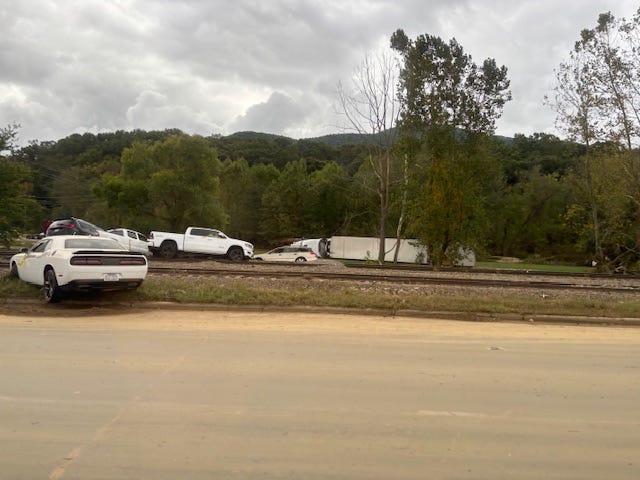
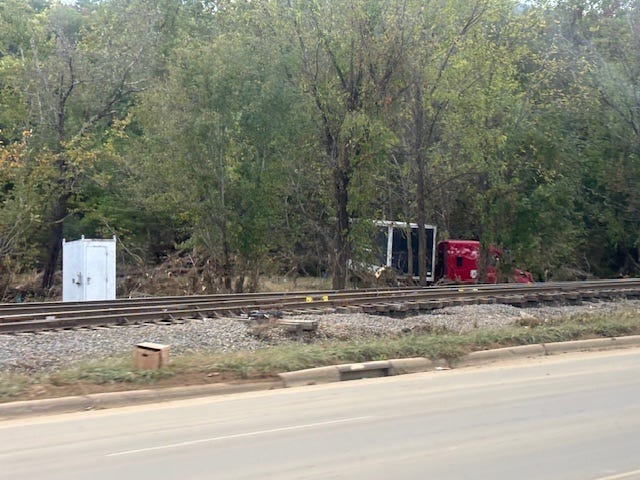
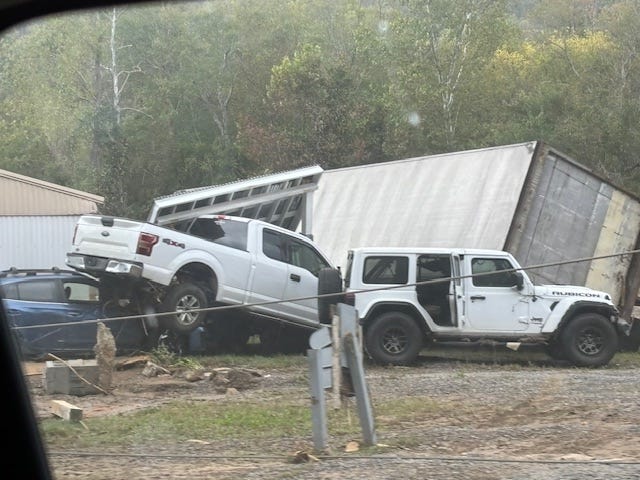
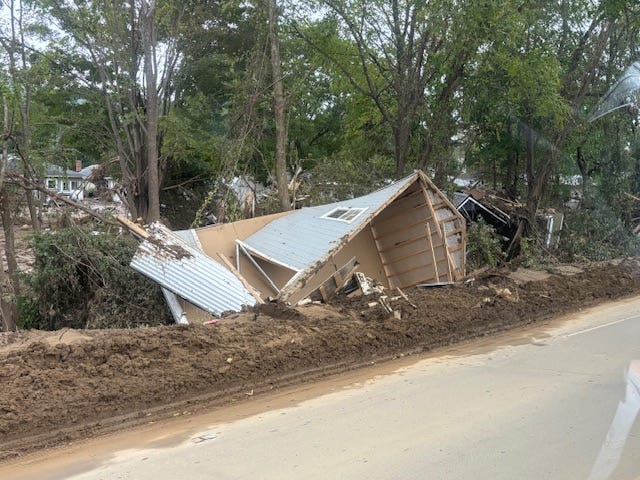
We drove out through Swannanoa, which had been much worse hit than Black Mountain since the Swannanoa River runs through it. Power truck after power truck lined the roads working on the main lines. As we crept through town, we passed tractor trailer rigs from the Ingles distribution center jackknifed on their sides in the trees 100 yards off the road. Parts of the railroad tracks dangled in midair; the gravel underneath simply washed away. Muddy cars sat in unnatural positions, sometimes on top of each other, with boards and debris piled against them. Small handi-houses showed their bellies to the sun and railroad cars could be seen laying on the embankment beside the tracks. Parking lots were coated in 6 inches of thick mud. In the midst of this were people, carrying boxes of items they’d salvaged and trying to move waterlogged furniture. A Coast Guard helicopter landed at the Harley Davidson store, the only business with a large enough landing area because it’s usually filled with bikes for weekend rallies.
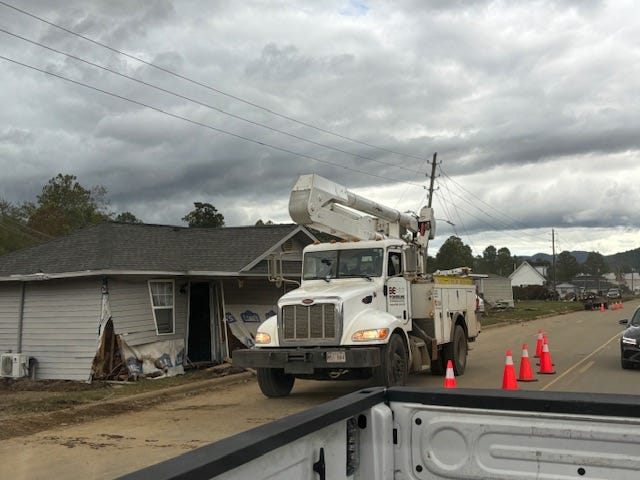

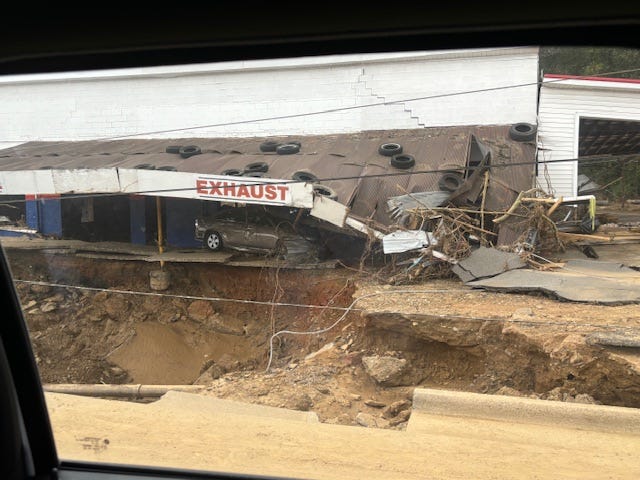
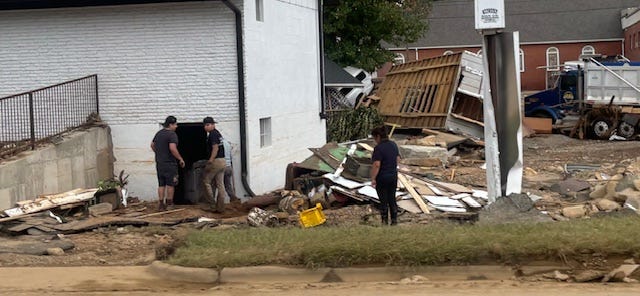
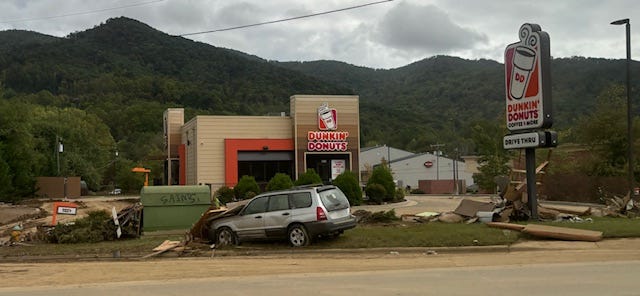
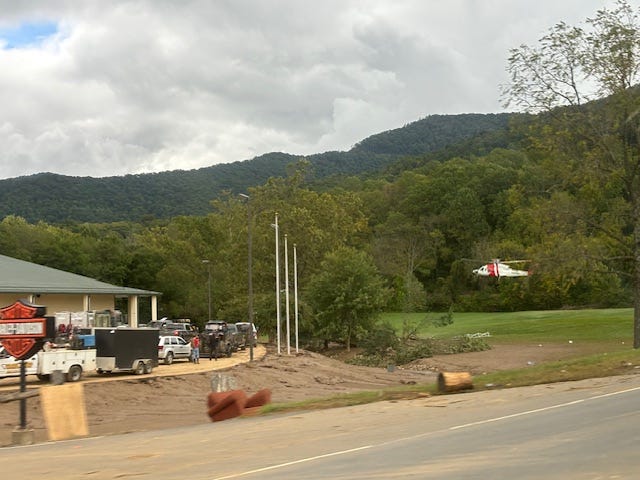
All of this was under fast-moving water only days ago. I don’t know if everyone was able to leave in time, if the water rose slowly enough to allow for warnings to be sent. I don’t know if there are bodies in that debris – of people, pets, or wildlife. I don’t know what it felt like to be there, in the midst of all that water, or to be there now, trying to salvage the leftover photos and books and stuffed animals from the wreckage.
This area will need help for a long while to come – not just with power and water, but with the emotional impact of having everything you know be suddenly shifted, changed, erased. The world, for these folks, looks entirely different than it did last week. It feels like a war zone there, the world scraped down to the essentials, the bottom rung of Maslow’s Hierarchy of Needs.
But I do know that people are resilient, and it showed in their doggedness as they cleaned up and their calmness as they stood in line for supplies and in their gratitude as they accepted the small offerings we and others brought. These folks will recover and be able to say they survived this. For all of us, we will be able to be proud of how we came together and supported each other and demonstrated the best side of what it means to be human.

We were 3 days without power and are fortunate that it has been restored.
After opening the lid to the toilet tank, Dad had second thoughts…

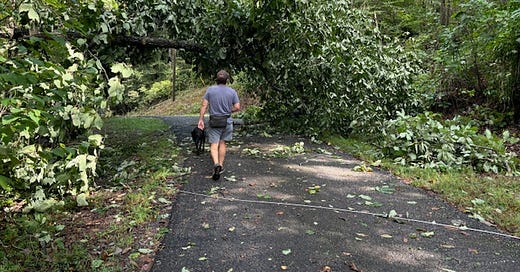



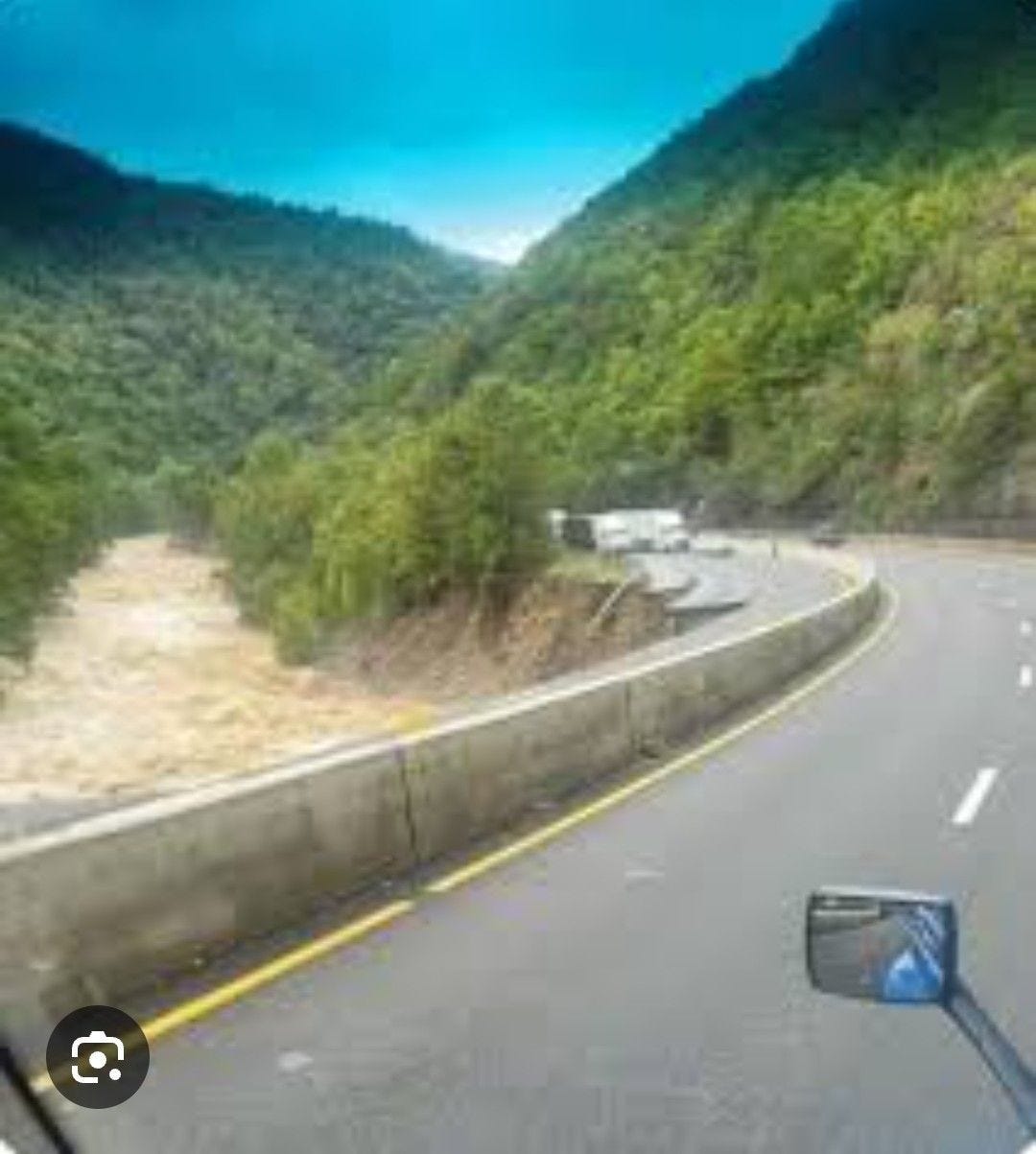
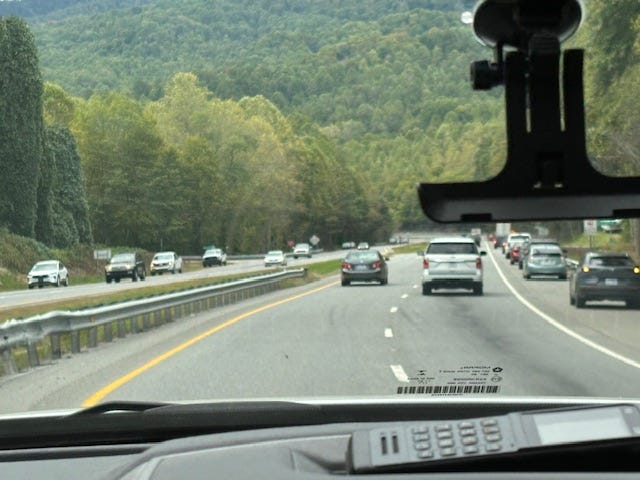
Thank you for sharing your perspective and for sharing provisions with those in need. Praying for you and all those in western North Carolina and eastern Tennessee!
God bless you, Andrew and your brother for taking supplies and helping out. We love WNC and pray for the long recovery ahead! It’s hard to imagine the devastation, but your description made it seem real for those of us who haven’t seen it.